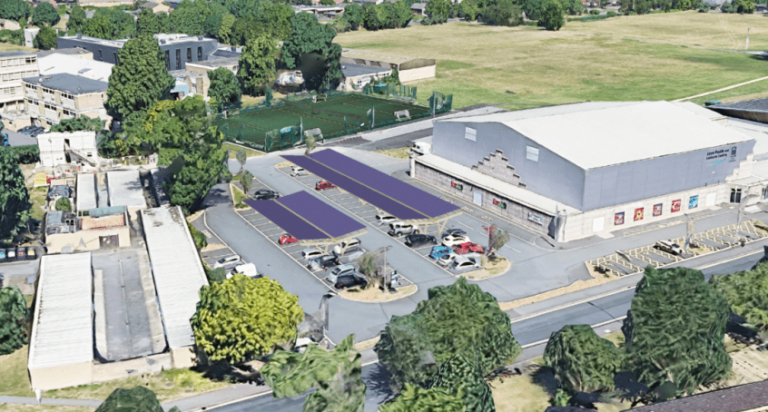Installation of one of the UK’s largest public solar carports at Leys Pools and Leisure Centre in Blackbird Leys, Oxford, has taken place.
A canopy over 48 car-parking spaces, featuring more than 350 solar panels, will deliver over 80,000kWh of green electricity to the Leys Pool and Leisure Centre per year, enough to power about 25 homes.
The £175,000 solar carport, commissioned by Oxford City Council with support from Fusion Lifestyle, has been installed by 3TiEnergyHubs, further reducing carbon emissions from the council’s own buildings.
The project is 90% funded by the Salix Recycling Fund, which matches funds public sector organisations in investing in energy efficient technology.
The £9m leisure centre, which opened in 2015, houses a 25m pool with movable floor, crèche, badminton courts, and more. Leys pools also hosts a 122kW solar panel installation on the roof of the swimming pool building which, combined with the car port, provides a total of around 190,000kWh or over 23% of the building’s annual electricity needs.
Oxford City Council has reduced its own carbon footprint by 10% – more than 900 tonnes – in the last year, with council’s carbon emissions falling by over 40% in the last four years. The reduction in the last year is reportedly the equivalent amount of CO2 produced by a single car driving 2.9 million miles.
The council is now generating the equivalent of 12% of its annual electricity consumption from photovoltaics on its own buildings. Alongside the Leys Pools and Leisure Centre, roof top solar panels generate green electricity at Rose Hill Community Centre, Horspath Depot and St Aldate’s Chambers among other sites across the city council estate.
The council said it is responsible for 1% of emissions in Oxford, with the University of Oxford cited as the largest contributor to the city’s footprint at 8% of total emissions.
Councillor Tom Hayes, cabinet member for Zero Carbon Oxford, said: “By installing one of the UK’s largest public solar carports, Oxford City Council has leapt forward in our journey to become a zero-carbon council in 2020.
“The days of fossil fuels have to be numbered. Our shift to renewable, and especially solar, energy is gaining pace and gives us the opportunity to put into practice the recommendations of our Citizens’ Assembly on Climate Change.”





